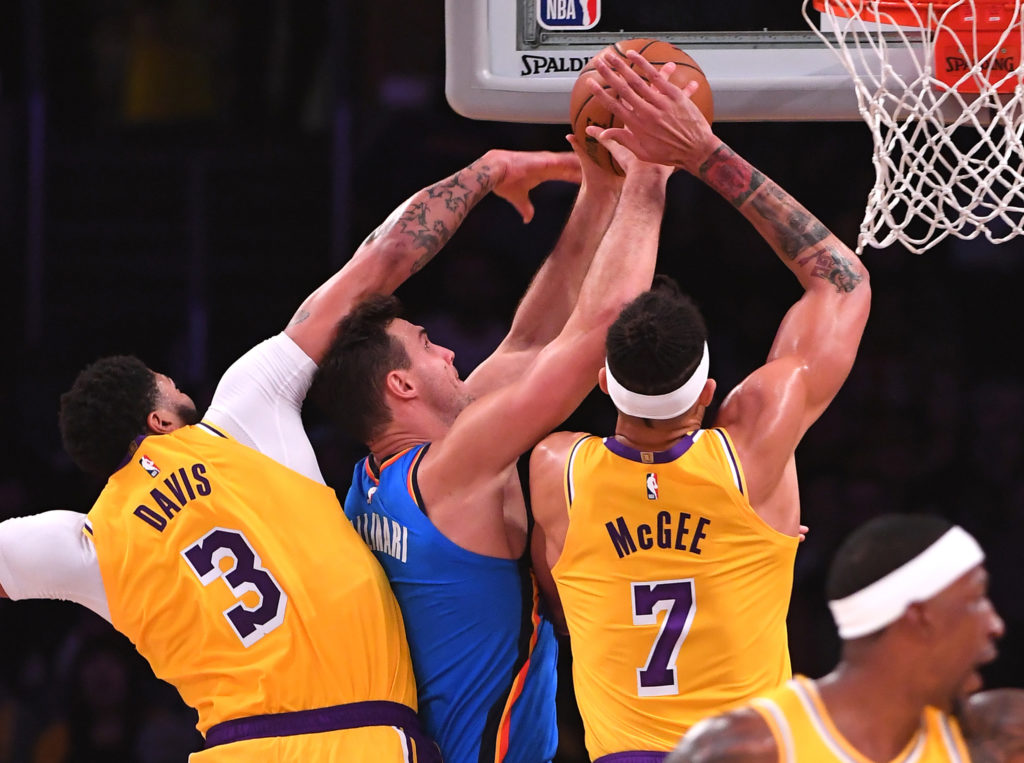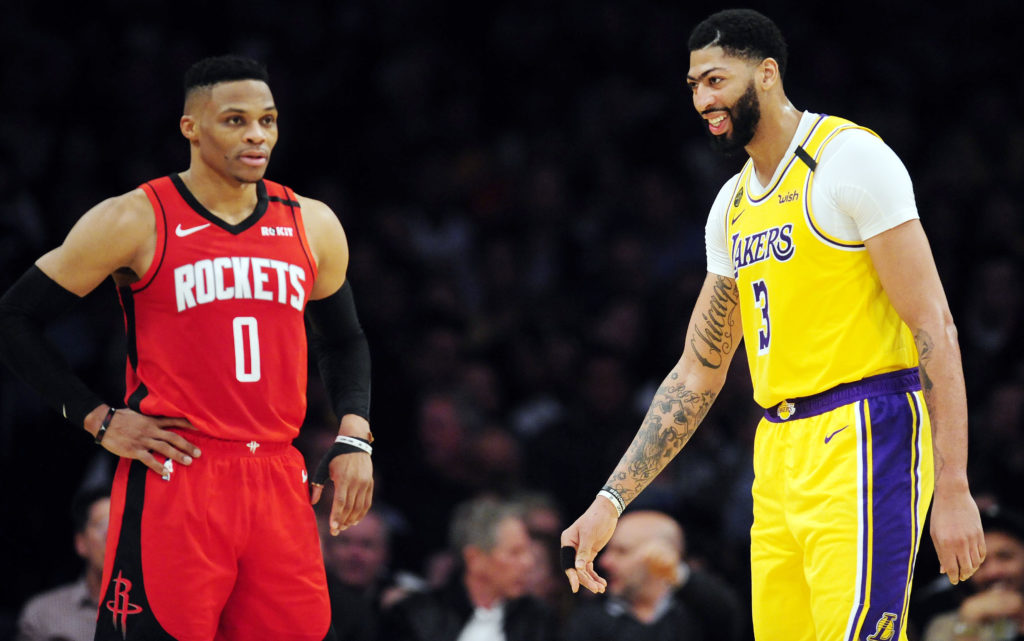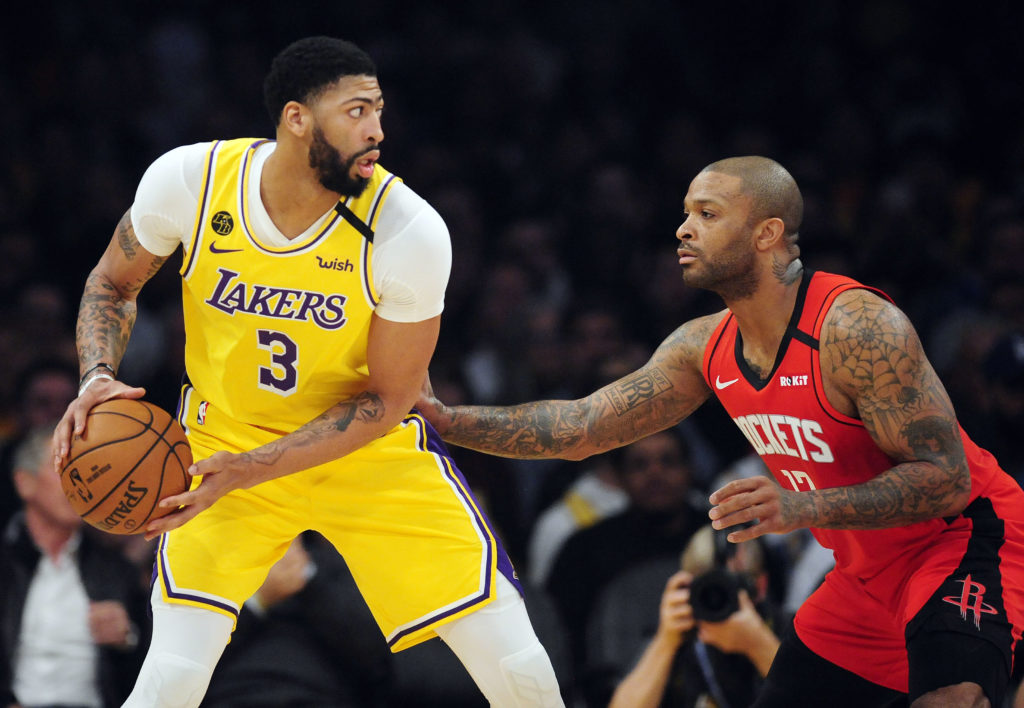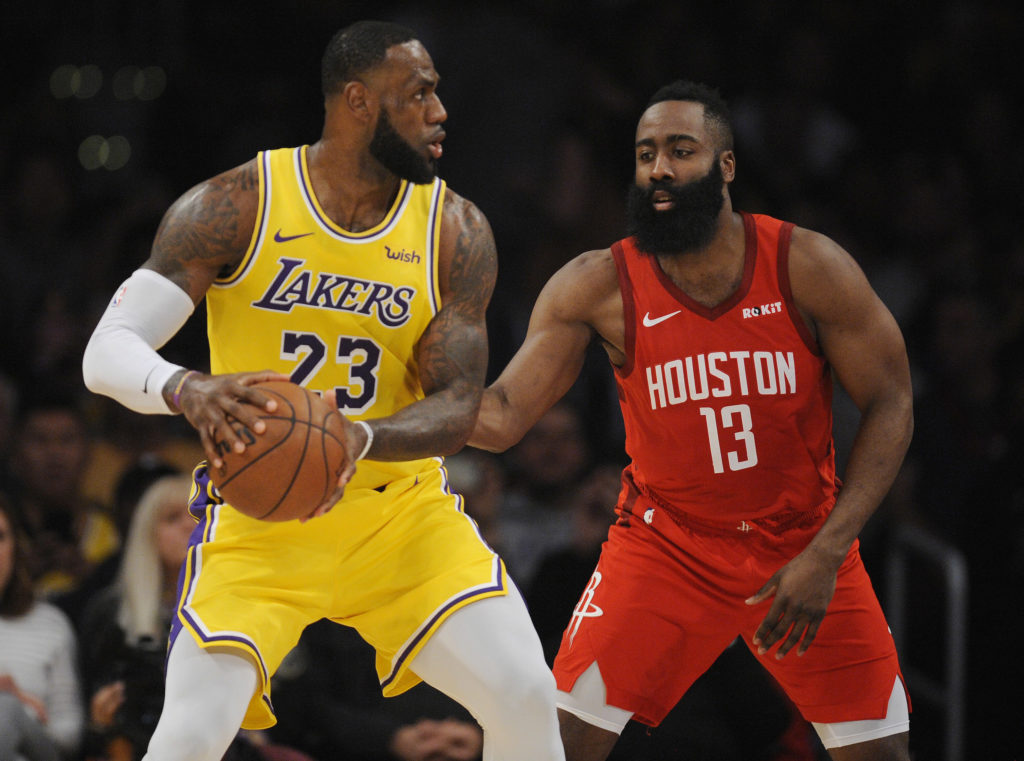The Lakers wait to see who they would face in the 2nd round is over. The Rockets have advanced, beating the Thunder in 7 games on Wednesday night. The turnaround time for Houston is brief, with game 1 vs. a well rested Lakers team on Friday, less than 48 hours from the time the final buzzer sounded against OKC.
Like with the Blazers in the 1st round, there’s plenty of chatter about the disadvantages the Lakers face and the challenges they’re up against vs. this particular opponent. These concerns, like they were against the Blazers, are founded in truth. That the Lakers were able to dispatch Portland in the manner they did should not erase that those concerns were real and they definitely should not ease concerns that Houston is a tricky opponent that is poised to push the Lakers in unique ways by challenging their ability to stick with their identity while also being malleable enough to meet the Rockets head on.
Do I think the Lakers are underdogs? No, I don’t. But, Houston is a more than worthy opponent who is capable of winning this series should they prove able to dictate the terms of engagement, force and bait the Lakers into specific types of mistakes that Houston is so good at capitalizing on, and have some of the more shaky parts of the Lakers game show up more prominently than they did vs. the Blazers.
Houston is an explosive offensive team and a unique defensive one. They play a style that can not only catch you off-guard, it can incept you into attacking a certain way that only further tilts the game in their favor. They try to beat you not only with skill and and a resolute “little man” toughness, but with math: 3 > 2. They will push the limits of “analytics ball”, goad you into trying to keep up, and then pounce when you falter. At least, that’s what the best version of them does.
The key, then, is knocking them off the best version of themselves. The Lakers have the right ingredients to be able to do this. With their star players, the team’s overall size across all positions, their athleticism, and the tactical smarts of their coaches to scheme a gameplan and their players to execute it, the Lakers are more than good enough to advance. It will take a keen discipline and focus. The mental energy to lock in and remain that way, possession after possession, game after game will be taxing in ways that go beyond the Portland series (which required a high level in its own right).
As the series plays out, I’ll have more thoughts about what’s working and what’s not, what strategies can be employed or scrapped, and what tweaks can be made within the initial plan to propel the series in the Lakers favor. For now, though, heading into this matchup I have a handful of things I have questions about and specifics I’ll be watching for. In no specific order…
1. How effective can the Lakers “big” lineups be and how much should they play? As is often said in boxing, styles make fights. You’re not likely to find two styles as divergent as what we’ll see in this series. The Rockets want teams to play small to match up with them. They want them spread out vs. their offense, they want them easier to matchup with defensively. The Lakers want to play big and they want to try to get you to play big with them as that’s where Anthony Davis can feast and it’s where the Lakers open court game with their superior big-men athletes will shine. From a tactical standpoint, many will want to shift AD to C in order to have the “best of both worlds” vs. Houston, but my first inclination is that this is incorrect. It can work, for sure, but as I noted above, you cannot let Houston determine the terms of engagement. Playing smaller and spreading out helps create the driving lanes and angles that fuel the best parts of Houston’s offense. If they’re able to slash to the paint for scores and drive and kick opportunities, they get the best of both worlds and closer to their analytics ethos. The Lakers can be at their best this series by effectively clogging the paint to deter drives and shrink the floor to make their closeouts easier. By staying big, they can also pound the offensive glass, maitain lob threats in the halfcourt to make Houston’s defense protect more of the court, and maitain their ability to generate transition opportunities.

Now, will this group be able to defend? Can they rotate as well as they need to? Can they do it without fouling? Will JaVale have enough defensive discipline? Can Dwight change ends from offense to defense as quick as he’ll need to when going for as many offensive rebounds as he’ll chase? These are the games within the game that will determine how well the Lakers preferred approach of maintaining their standard rotation can last. Don’t get me wrong, the Lakers can play small and win. There are lineups I think that can and will be effective when “downsizing”. But in this battle of styles, it’s imperative for the Lakers to win some of these rounds that they’re fighting their way. If they cannot, the series tilts away from them.
2. Who defends Russell Westbrook? In the February game that these teams played after the Rockets fully committed to this small-ball style by trading Clint Capela, Westbrook was a forceful dynamo who dominated the game. He scored 41 points on 28 shot attempts and only took 2 shots from behind the arc. He bullied Alex Caruso and Kyle Kuzma, and even took it to AD and JaVale by relentlessly attacking the paint vs. everyone who tried to defend him. Coming off a quad injury that kept him out of part the 1st round, Russ looks fully healed but does not yet have his timing and feel. He’s getting closer, but wasn’t quite there even in Wednesday’s game 7. This series can turn if Russ finds his way back to being the player he was in that early February matchup.

The Lakers need to defend Russ a very specific way; they need to sag off him to encourage his jumper, but not so far off him to give him a runway to drive. They need to meet his force with force, but lack the personnel to do that at the point of attack with a single defender for the full game. Finding ways to turn him into a jumpshooter, limit his ability drive for scores and then turn that threat into drives and kick passes to open shooters, and corrall him in transition is a yeoman’s task. I’m not sure if KCP is up to it. My sense is that Danny Green is not. Caruso and Kuzma are reserves who will get their chances, but Russ will attack both relentlessly to make them prove they’re up to the challenge. In the end, the best options may end up being LeBron and Anthony Davis, but I am not sure Vogel wants either doing this for a full game. Whoever gets the primary assignment, though, is up for a specific type of physical challenge. Like meeting Bo Jackson in the hole at the line of scrimmage. It takes a certain fortitude to keep plugging that gap. As great as Harden is as the ballast for Houston’s attack, it’s Russ’ effectiveness that can most impact this series and raise the Rockets chances of advancing. The Lakers will need to slow him.
3. There are going to be people who tell you this series should belong to Anthony Davis. That his height advantage and athletic gifts vs. the players who will primarily defend him mean he should dominate. They’ll tell you AD shoud post up against smaller guys and use phrases like “impose his will” on them. Ignore these people. The best version of AD vs. these Rockets will very likely be a player who is receiving the ball on the move to score, via screens, cuts, dives, when attacking the offensive glass, and in transition. I doubt very much you will see the best version of him as a stand-still shot creator for himself; a player who is isoing in the post or out of the triple threat from the mid-block or working off the dribble from the top of the key is not likely to produce efficient results.

In our LFR Pod preview for this series, I said that “this is not an Anthony Davis series” and while that would be aggregated if I was someone worth aggregating, what I mean by that statement is that asking AD to do to these Rockets what he did to the Blazers is not the best way to use him. AD can dominate the Rockets, but it will be in a much different way than many will try to tell you he should. He needs to be active and on the move, playing above the rim and in space.
4. This is a series for LeBron the scorer. No team switches more than Houston, both on and off the ball via screens and player exchanges. Houston will switch themselves into less desirable defensive matchups solely to maintain the continuity of their scheme and to ensure everyone is executing cleanly. When they’re at their peak, this can disrupt teams who rely on motion attacks and P&R heavy systems where the goal is to get the ball handler or a cutter free into space. Where this system can fail, though, is with individual shot creation via a matchup buster who cannot be defended easily at any level of the court. This is where LeBron comes in.

There are few players in the league who can punish a defense as a post player (both to score or to pass) while also offering as much off the bounc juice as a downhill driver as LeBron. Houston, via switches, will offer up favorable matchups for Bron to capitalize on both on the perimeter and in the (mid and low) post. LeBron will need to exploit these matchups to score first and to pass second. If he’s scoring well the help will come and when it does there are few, if any players, I trust more to make the right pass to the right player for an open shot.
5. It’s weird it’s taken this long to get to James Harden, I know. He’s the league’s leading scorer, possessor of one of the game’s most devastating weapons (his stepback 3), and can carve you up with his passing ability when you over commit to him. I expect the Lakers to defend him with a multitude of players, but I’d bet it starts with Danny Green who has size, strength, smarts, and a history of defending Harden through their many interconference battles when Danny was in San Antonio. Let me be clear, no one player can defend Harden, he’s too good. But, like the Lakers did with Dame, there are tactics to slow him down and make his life harder. If there’s a goal on any given possession vs. Harden, I’d say it’s to limit his ability to get into the paint, press him closely enough to make his stepback jumper harder, and avoid fouling him. Accomplishing all those things at the same time are incredibly difficult, but I think the Lakers do have some incredients to give them a chance. It starts with having reliable big man help lurking near the paint and a disciplined point of attack defender who has the strength to stay attached to Harden and the smarts to influence the parts of the court available to him to drive to. The combination of Green, Caruso, and Kuzma can provide the latter and the foursome of AD, JaVale, Dwight, and, yes, LeBron can provide the former. These guys will need to work in tandem and they’ll need to be at their smartest and highest level defensively, but it’s possible. Whether they can hold up for a full series, though, remains to be seen.
6. What to make of Rondo? Rondo’s not played in months, but Vogel said this week that he hopes that Rondo will not only be available to play but that he will be a part of the rotation. How big a part is not known, but color me skeptical on how effective he can be. Not becuase he doesn’t have some skills that can help or that he’s not good enough (though both of those things have crossed my mind), but becuase jumping from not playing at all for this long into the 2nd round of the playoffs is a high bar to clear. Rondo’s best way to help this series likely comes from his ability to general transition possessions and push the tempo. But there’s a lot of game that falls outside of that narrow lane and whether he’s up to it and how long Vogel sticks with him if he’s not is something I’ll be watching intently.
7. Speaking of transition, the Lakers need to be aggressive in looking to run and score in early offense. Houston has upped their defensive level since going small in the halfcourt, using their quickness and adherence to their scheme to generate good results. Houston has a good transition defense, but they can be susceptible to runouts and grab-and-goes due to their offensive alignment of always having two players deep in the corner. If the Lakers can get to Houston in early offense, they can get baskets in the paint and the types of open 3’s that really boost their offensive efficiency.
8. Here’s a small, but meaningful thing: please mark PJ Tucker crashing the offensive glass from the corner. PJ is not the most athletic guy, but he’s excellent at sneaking in from the corner and keeping the ball alive on missed jumpers. Houston forces you to watch the ball a lot defensively and when you peek for too long, Tucker darts into the paint to create an extra possession. This is a team you cannot give extra possessions to.
9. On that note, the Lakers must limit their turnovers. Again, extra possessions can only enhance the math problem Houston forces onto opponents.
10. The Lakers need to play physically, but they also need to play smart and with cool heads. Avoid fouls, especially on jumpshooters. Do not reach in and pick up cheap fouls that get the Rockets into the penalty early. On the flip side, expect the Rockets to play a physical brand of ball in the paint and don’t expect the whistles to fly. Whether it’s human nature of giving extra leeway to smaller players or the individual defensive reputations that allow a bit more contact inside, the Rockets will avoid whistles on swipe-downs, physical box outs, and extra contact inside. The Lakers need to play through that stuff and not get frustrated if they don’t get calls they think they’ve earned. There’s one opponent to play: the Rockets. If you allow the referees to become another opponent, you negatively impact the focus needed to execute at the level needed to beat this team.
We’ll have more as this series progresses, but that’s it for now. This should be a good, hard fought series and I’m looking forward to seeing if the Lakers can play to their top level. If they do, they should be able to advance.